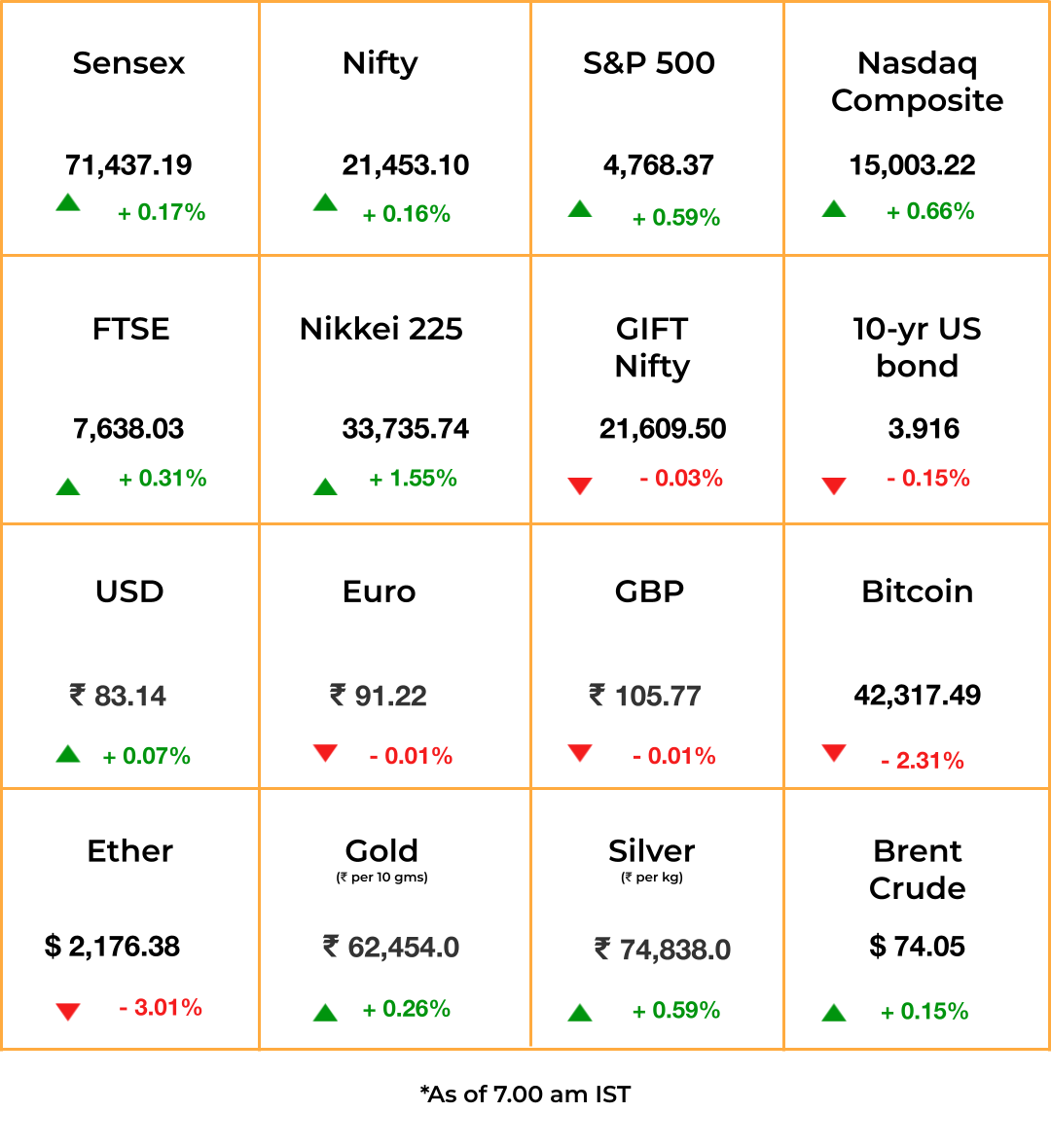IMF bowls a floater to RBI
Also in today’s edition: No more wires; Apple’s holiday is ruined; Unravelling by design; Heir not apparent
Good morning! How far would you go to get a bonus? A company in China is asking that question literally. Business Insider reports that Guangdong Dongpo Paper has told its employees that their bonuses will be determined by the number of miles they run each month. 62 miles/month gets you 130% annual increment, 31 miles/month gets you a month’s salary worth of increment and 19 miles/month gets you an increment equalling 30% of a month’s salary. Nithin Kamath would be proud.
🎧 Koffee With Karan is rolling in dough. Also in today’s edition: The cult of Ozempic. Listen to The Signal Daily on Spotify, Apple Podcasts, Amazon Music, Google Podcasts, or wherever you get your podcasts.
Venkat Ananth and Adarsh Singh also contributed to today’s edition.
The Market Signal*
Stocks & Economy: Global stocks seem unstoppable. All indices in the US have set record peaks or are well on their way to end the year at all-time highs, buoyed by expectations of a relatively easy interest rate regime in 2024. Asian equities are following closely.
Green was the dominant colour all over the Asian charts on Wednesday morning. Investors in Japanese stocks celebrated the Bank of Japan continuing with its ultra loose monetary policy with a rally, patting their own backs for getting the decision spot on.
Rising hazards on the Red Sea trade route are fuelling oil prices.
Indian equities too set new peaks on Tuesday and are expected to start Wednesday flat or slightly higher, the GIFT Nifty indicates.
POLICY
All Aboard The Telecom (Omni)bus
The Centre has tabled the Telecommunications Bill 2023—to replace the Indian Telegraph Act, Wireless Telegraphy Act, and Telegraph Wires (Unlawful Possession) Act—in the Lok Sabha via controversial means. If passed, it’ll reform spectrum allocation, licensing, and mandate biometric verification for messaging apps.
There were concerns that the Bill’s sweeping definition of “telecommunication services” impinges on internet-everything too (streaming services, email, etc). There’s still confusion over the matter, though industry body IAMAI believes the Bill excludes internet-based communications. But WhatsApp, Zoom, and Gmail may now (and confusingly) fall under the ambit of telecom services, meaning they’d need authorisation to operate. Under the new Bill, the Centre can also formulate encryption standards—which could deal a blow to existing end-to-end encryption apps.
In a setback to Reliance Jio and a win for Starlink, Amazon Kuiper, and Airtel OneWeb, satellite internet services will no longer have to bid for spectrum.
TECH
No More Watch-ing
Apple is in for a world of trouble. The company is halting the sale of its flagship Apple Watch Series 9 and Apple Watch Ultra 2 in the US. The decision comes in the wake of a protracted and messy legal battle with Masimo.
The Issue: We’ve covered Apple’s strategy of cannibalising intellectual property (IP) of smaller companies. In Masimo’s case, the IP in question is SpO2 sensors and their measurement algorithms. Apple reportedly stole Masimo’s patented tech on the pretext of collaboration. Having sued Apple and won, Masimo’s now awaiting the end of the 60-day Presidential Review Period, which grants the President the power to veto the result of the lawsuit.
Result: The Review Period ends on December 25th, jeopardising Apple’s holiday quarter. While Apple has had similar results vetoed in the past, this time the picture seems different. If so, it’s bound to affect Apple’s plans for 2024.
ECONOMY
IMF Buys Into India’s Growth
Indian consumers are literally buying economic growth for the country. The International Monetary Fund (IMF) now believes India will grow at 6.3% in FY24, or 0.20 percentage points higher than it earlier predicted, thanks to Indians unexpectedly consuming more goods and services in April-June.
The forecast comes on the heels of Prime Minister Narendra Modi “guaranteeing” that in his “third innings, India will be among the world's top three economies”. The promise of a rousing economy and, therefore, jobs will likely be Modi’s primary pitch to voters in the upcoming 2024 elections.
Watch that debt: The IMF, however, has said that India needs “ambitious” fiscal consolidation to curb debt. It also took exception to the Reserve Bank of India’s (RBI) intervention in the currency market and redesignated the Indian forex system as a “stabilized arrangement” from “floating”.
The Signal
India unsurprisingly has taken exception to the reclassification of its forex regime. The RBI maintains that it only intervenes in the market to control volatility. The IMF disagrees, hinting that the central bank targets a rupee level. The move is perhaps also a subtle way of pressuring the country to make its currency freely convertible. Currently, one needs the RBI’s approval to buy foreign currency more than $250,000, unless it is for trade. The IMF in October had forecast India’s debt-to-GDP ratio to peak at 82.3% in FY25. It had zoomed from 75% in FY20 to 88.5% in FY21 but eased to 81% in FY23.
TECHNOLOGY
The $20 Billion Heartbreak That Isn’t
Adobe pulling out of its $20 billion pursuit of design tool firm Figma under regulatory pressure may not be the worst thing overall. It was an outcome that Adobe’s investors were quietly cheering from the sidelines, given the initial dissatisfaction over the deal price.
So, what next?
Strength to strength: Figma, as The Information reported, had an impressive 2023, with an estimated $600 million in annual recurring revenue, up 40% from the previous year. It has also jumped onto the generative AI bandwagon for its collaborative FigJam tool. That said, Figma’s big Aussie rival — Canva, must be relieved.
Ka-ching: While its investors such as a16z must be smarting from a few $b worth of exits gone abegging, Figma will walk away with a $1 billion termination fee, an infusion that couldn’t have been timed any better, especially with a potential 2025 initial public offering on the horizon.
SUCCESSION
Where There’s A Will… Or Is There?
LG, the $10 billion company best known for consumer electronics, is in the thick of a family struggle pitting the wife and daughters of former chairman Koo Bon-moo against his nephew-turned-adopted son, Koo Kwang-mo.
Life’s not so Good for the Koo women, who allege they were misled into believing Bon-moo willed personal and company assets to Kwang-mo. He didn’t. The matter is complicated because LG (like most chaebols or Korean family-run conglomerates) has been governed by male primogeniture since its founding; that was why Kwang-mo was adopted as heir in the first place.
The women have filed suit against Kwang-mo and some LG executives, accusing them of colluding to steal their rightful inheritance. The accused insist Bon-moo had left a “memo” outlining his wishes before his death. That memo… was shredded.
What’s unfolding in LG now, which has spun off five businesses, would make for the plot of a spicy K-drama.
FYI
Blow to Don: The Colorado Supreme Court has ordered former President Donald Trump removed from the primary ballot, disqualifying him from running for office. It has given time until January 4, 2024, for appeal in the US Supreme Court.
Pay up: Alphabet has agreed to cough up a whopping $700 million to settle a 2021 antitrust suit that claimed Google Play Store was an illegal monopoly. Also, as part of the settlement, it will allow developers to offer users direct payment options.
Down to the wire: With just over 24 hours to go for the Sony-Zee merger deadline, Sony Pictures Networks India is yet to agree to Zee’s request for an extension to conclude the deal.
Take two: Indian e-commerce company FirstCry will file its draft IPO papers, likely by next week, The Economic Times reported. The company is seeking to sell shares for $500 million-600 million to the public at a $4 billion valuation.
Payday: Australian fast-bowler Mitchell Starc became the most expensive player in Indian Premier League (IPL) history, with the Kolkata Knight Riders paying Rs 24.75 crore (~$3 million) for his services. Compatriot Pat Cummins held the record briefly, having been sold for Rs 20.50 crore ($2.46 million) to Sunrisers Hyderabad.
More red cards: Another 49 members of parliament belonging to India’s opposition parties were suspended for allegedly disrupting proceedings. The suspended MPs included Farooq Abdullah, Manish Tewari, and Shashi Tharoor.
Hot roads: A Canadian pension fund and private equity firm KKR are among 10 entities that have shown interest in buying 230 km of road assets from the National Investment and Infrastructure Fund. The sale could fetch up to $1.2 billion.
THE DAILY DIGIT
28,000+
The number of employees laid off by Indian startups in the first three quarters (between January and September) of 2023. The number is an increase from 2022, when over 20,000 people lost their jobs. (The Economic Times)
FWIW
Gone rogue: Have you ever been guilt-trapped into giving a good review? How about financial incentives? If yes, then you’re not alone. Review ratings have become a major part of the business for every service provider. And for good reason. A recent study found that an increase of a single star in an overall rating on Yelp can boost a restaurant’s revenue by 5% to 9%. With so much at stake, service providers are using every trick in their arsenal to get raving reviews. Neither customers nor platforms like Amazon and Yelp are thrilled about this and are cracking down on it. Guess that’s the price for a digital first world.
Nuts about it: Adding to the list of things that Gen Z ‘loves’, we’ve Snoopy! The beagle from the Peanuts comic strip is all the rage these days. His cuteness coupled with his range of emotions that capture the everyday highs and lows seem to be the driving factor here. Some also think that Snoopy’s imaginative personality (remember his alter egos like Pilot and Author?) is especially relatable to the younger Gen Zs. Whatever the case is, the agency handling Peanuts’ IP is raking in the moolah. Snoopy plushies have gone out-of-stock, with resellers selling it for $100. As his 75th birthday comes closer, clearly this is one trend that’s gonna last for some time.
Moving time: It’s not everyday that a volcano eruption dislodges you out of your home. But that’s exactly what happened with the 4,000-odd residents of Grindavik, Iceland. The government had to move them away because of a live volcano near the town. With the evacuation done in time, the residents avoided a major catastrophe. Why? Because the town was just hit by a “seismic swarm” of more than 1,000 earthquakes in 24 hours. Subsequently, the volcano erupted with lava gushing out of the earth and damaging major chunks of the town. The Iceland government has live-streamed the event as well, in case you want to see how a volcano explodes.









